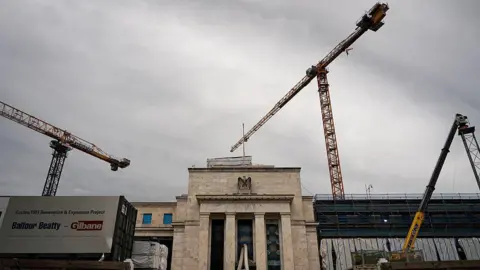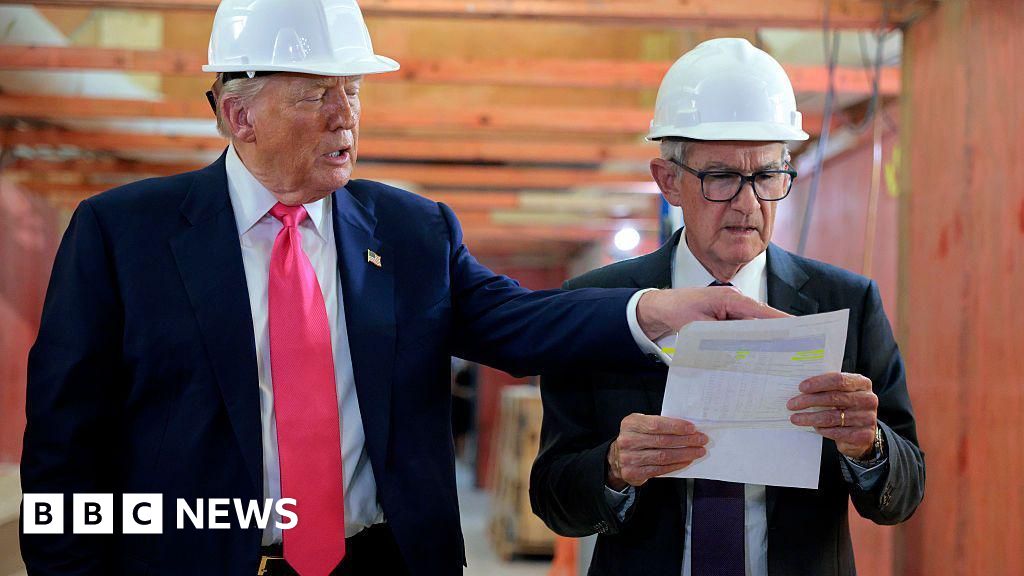BBC News
US President Donald Trump has spent months attacking the head of the US central bank on social media and in remarks to reporters.
On Wednesday, his dispute with Federal Reserve chairman Jerome Powell played out in person, with cameras rolling, as the two men clashed over the cost of renovations in buildings the White House has accused of mismanaging.
The tense incident came as Trump has been escalating his pressure on Powell, who Trump says is moving too slowly to cut interest rates.
He has repeatedly floated the possibility of firing Powell, only to quickly disavow the idea, which analysts say would rock financial markets and spark a legal battle.
Trump’s visit to the Fed is the first by a sitting president in roughly two decades.
It comes ahead of the Fed’s meeting in Washington next week, where policymakers are widely expected to vote to leave interest rates unchanged.
Speaking to reporters at the start of the tour, Trump said that the administration was “taking a look at what’s happening” at the Fed’s $2.7bn (£1.8bn) renovation.
“It looks like it’s about $3.1bn,” Trump said, as Powell shook his head besides him.
“I’m not aware of that,” Powell shot back. “I haven’t heard that from anybody at the Fed.”
Trump then produced a document from his jacket pocket, which Powell briefly read and brusquely handed back to the president, saying that he is “adding a third building” to the total.
“It’s a building that’s been built,” Trump said.
Powell responded: “It’s a building that was built five years ago…it’s not new.”
Trump was also asked by a reporter what he, as a real estate developer, would do with a project manager who was over budget.
“Generally speaking, I’d fire him,” he responded.
Under US law, governors of the central bank can only be removed “for cause”, typically understood to be major misconduct.
The protection was intended to help insulate the bank from political pressure and ensure its leaders set policy in the best interests of the economy.
Legal experts have said cost overruns on the construction project would not typically meet that bar.
During the visit, Trump was asked whether Powell could say anything that could prompt him to back away from criticism, he said that he would “love to lower interest rates”.
Still, White House officials and Trump allies have honed in on the renovation issue.
Trump – who has alternately referred to Powell as a “numbskull”, “stubborn mule” and “Trump hater” – told reporters this month that he believed mismanagement of the plan was “sort of” a fireable offence.
Democrats have accused Trump of trying to use his attacks on Powell to “distract and deflect”, as he faces pressure from his support base over his handling of Jeffrey Epstein files.
They have also argued he is setting up Powell to be the scapegoat should the US economy weaken.
 Getty Images
Getty ImagesTypically, the Fed lowers rates when the economy is in trouble, hoping that by making it easier to borrow it will boost economic activity and keep employment stable.
It raises interest rates when it is worried about inflation, aiming to slow activity and ease pressures pushing up prices.
Economists say Trump’s radical changes to economic policy, including higher tariffs, tax cuts, reductions in government spending and a crackdown on immigration, have raised risks of both scenarios, making it difficult to know what the bank should do.
Powell has said he believes the economy is stable enough for the Fed to wait to see what happens.
Trump has said the bank should be cutting interest rates to reduce the US government’s hefty borrowing costs and to make it easier for Americans to get mortgages and other loans.
He maintains that inflation, which rose to 2.7% in June, has faded as a problem.
Powell was appointed by Trump to lead the bank in 2017, and renominated by Joe Biden. His term as chairman is set to end in May 2026.
The renovation project under attack was first approved in 2017 and was intended to allow the bank to consolidate its operations.
It involves two buildings from the 1930s.
The Fed has blamed the cost overruns on issues such as finding more asbestos than expected, and disputed White House characterisations of other aspects of the project, such as whether it involves a “VIP elevator”.


